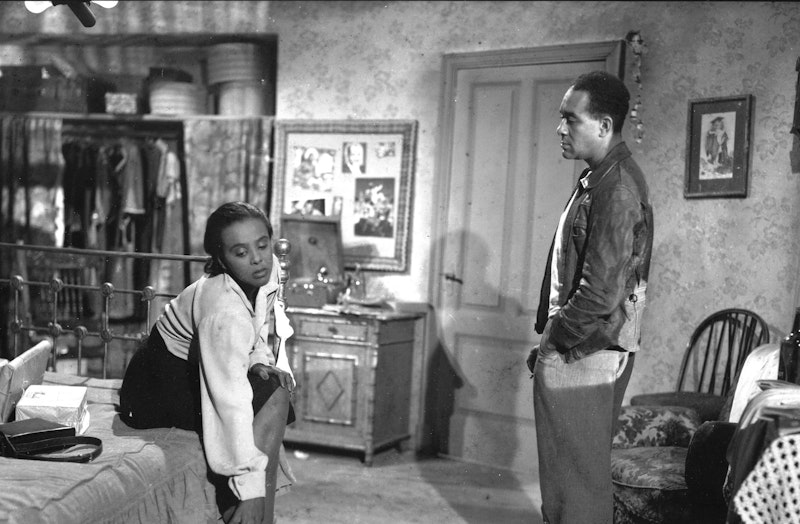Richard Wright’s 1940 novel Native Son was a massive bestseller, meaning interest soon emerged in a film adaptation. It was also a novel about race in America from a Black perspective with a Black man as the lead character, meaning the mainstream American movie industry in the 1940s couldn’t imagine adapting the book faithfully. It did become a stage play in 1941, directed by Orson Welles, but the book went without a film version for more than a decade as prospective producers insisted on changing the story to focus on a white man.
Ultimately, Wright agreed to work with French director Pierre Chenal, who was determined to make a film close to the book and play. France and Italy refused to give a home to the production, apparently because they were worried about offending the American government while receiving Marshall Plan funds. The film was made in Argentina, whose movie industry was then in a golden age, but shot in English, with the book’s Chicago location carefully recreated.
The hope was that Canada Lee, who’d played the lead character in Welles’ theater adaptation, would reprise the role for film. That didn’t happen, and Chenal decided to cast Wright in the lead role. Wright, 42, had to play a character aged 20 in the book and 25 in the film; with no acting experience. But Wright makes up for a lack of training by knowing the character inside and out, producing a fascinating if strange performance in a fascinating if strange film.
It’s the story of Bigger Thomas, a poor and angry Black man. He finds a way out of the ghetto when he’s hired as a chauffeur by a wealthy and vaguely liberal-minded white family. The young daughter of the family (Jean Wallace) and her boyfriend (Gene Michael), patronizing but well-intentioned, take an interest in Bigger—but then Bigger accidentally kills the daughter, and his life becomes more nightmarish with every following choice he makes.
Chenal shoots the film as a noir, with expressionist backgrounds sprinkled among realist sets. Shadows are dense and foreboding. There’s a Hitchcockian intensity to Bigger’s story, except that where the typical Hitchcockian lead is an innocent man caught up in a case of mistaken identity, Bigger really did do a terrible thing and his story is him scrambling to get away with it and stay alive. There’s a fatalist tone to the movie.
There’s also, the element of race. The death comes about because Bigger knows he can’t be found in a white woman’s bedroom with the woman drunk in her bed. The movie’s aware of the significance of every touch between a Black man and white woman—it had to be, as Jean Wallace took on the role of the heiress only after other actresses refused a role in which they had to touch a Black man.
There’s a sense of honesty that’s unlike contemporary Hollywood. Characters use slurs in casual ways that even bad-guy racists in mainstream American films wouldn’t. Bigger isn’t an uncomplicated, morally-stainless hero, but a man scarred by the racism and poverty that’s surrounded him all his life.
The movie’s not flawless. Notably, the acting’s a mixed bag. Jean Wallace is very good, Wright is at least interesting to watch, and some of the supporting cast do an adequate job. Others are less effective, in particular Don Dean as a lawyer, Mr. Max, who comes in near the film’s end.
And a few ideas are raised but dropped. There’s an opening voice-over narration in third person, a device that doesn’t return in the film. Bigger, we’re told, dreamed of being an explorer; that doesn’t come into play. Bigger’s family, who we see in that opening scene, are largely lost in what follows.
But a lot of the film works, especially its visuals. The lighting and set design is strong, there’s an understated depth of field that makes the film feel bigger than it is, and some set-pieces and camera moves are lovely—an extended tracking shot as Bigger and his girlfriend climb up through a deserted building; a series of pans back and forth across a building being invaded by cops, showing chaos through first one set of windows and then another.
The tone's handled with sureness. The accidental killing that kicks events into motion could’ve been comedic or melodramatic if Chenal’s touch had been even slightly off; this is the scene, I think, where Wright’s unfamiliarity with acting comes closest to tipping into absurdity. But it never overbalances, due to some effective choices by Chenal.
The last words of the film are weak—a final conversation between Bigger and Max in which Bigger tells the lawyer he didn’t know there were people as good as him; implicitly, that there were such truly idealistic white people. That’s unconvincing, though I wonder whether Wright at this point doesn’t do something subversive. All through the movie, when Bigger’s around whites, he puts on a subservient facade, speaking with a softer, higher voice. It’s in that voice Wright delivers Bigger’s last lines. Was he hinting that his Bigger didn’t really believe what he was saying, but even then was playing out what he guessed the white people around him needed to hear? Or was he, the original author, unconvinced by this choice for the ending?
The movie reached the United States in a version butchered by censors and was widely panned. That’s unjust, and the film’s long, troubled production and distribution points up what it has to say about race. When seen as a whole its virtues become prominent. This is a good movie, and a fascinating document.

